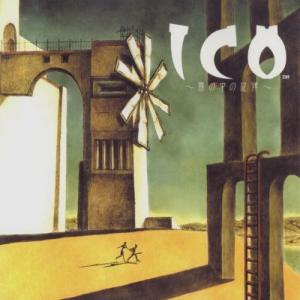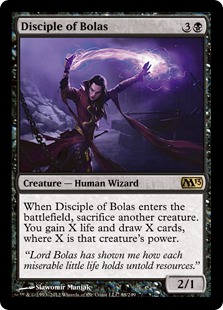
With my long holiday finally over, it’s time to get back to work in wonderful world of video games, and what better way to do so than completely side step the entire medium? This week, instead, I’ll be on about the popular card game Magic: The Gathering. One does not even need to play it for an extensive time to notice that it shares many key concepts with video games themselves. That said, one of my favourite concepts, in both Magic and regular old video games is the act of enhancing a narrative through the gameplay itself.
It is worth explaining, to those unfamiliar to the game Magic, the basic premise: you are a Planeswalker, a powerful mage who uses his or her powers to summon armies of creatures and other spells to fight other Planeswalkers in an endless battle for dominance reflected in real life by players playing cards out of hands to help them defeat their opponents. Obviously there are large differences between this and any traditional game, namely that one doesn’t spend a third of his or her savings trying to play Call of Duty online, unless you own an Xbox. However, many games in the past have left me jumping with glee after just the first 30 seconds of play because of how sufficiently impressed I am with their design.
 Consider ICO, an action puzzler developed by the since-renowned Team ICO for the PS2 a while back. The game doesn’t have any real dialogue until you get a couple hours into it, but even so you gather what is going on, just by playing the game. After you free a mysterious, caged girl, shadowy monsters begin to show up and try to drag her down into one of their many equally shadowy pits, only stopping to knock you out of the way so they may continue on with their work. We still have no idea who this girl is, but if these monsters are just going to ignore you and grab her, obviously she is pretty important. This is further elaborated on when you come to an otherwise impassable doorway, and she uses some sort of magic to open it so you may continue, now making it clear that she is your only hope of escaping the odd temple you found yourself in to begin with. The fact that all of the enemies focus on her, and many of the puzzles require her to be with you to complete them all contribute to the overarching narrative of the game.
Consider ICO, an action puzzler developed by the since-renowned Team ICO for the PS2 a while back. The game doesn’t have any real dialogue until you get a couple hours into it, but even so you gather what is going on, just by playing the game. After you free a mysterious, caged girl, shadowy monsters begin to show up and try to drag her down into one of their many equally shadowy pits, only stopping to knock you out of the way so they may continue on with their work. We still have no idea who this girl is, but if these monsters are just going to ignore you and grab her, obviously she is pretty important. This is further elaborated on when you come to an otherwise impassable doorway, and she uses some sort of magic to open it so you may continue, now making it clear that she is your only hope of escaping the odd temple you found yourself in to begin with. The fact that all of the enemies focus on her, and many of the puzzles require her to be with you to complete them all contribute to the overarching narrative of the game.
Now before this derails any further, let’s go back to the bigger question of how this relates to playing Magic. Well we already know the premise: you are a Planeswalker, your opponent is a Planeswalkers, recently they made it possibly for you to actually put a Planeswalker into play from your hand, and for the first time since their Planeswalkers entered Standard play, cards in the recently released ‘M13 Core Set’ actually mention Planeswalkers in their text, whereas before a Planeswalker was just referred to as a ‘non-land, non-creature card’ along with a few other types. Judging by the number of times I just used the word ‘Planeswalker’ in that single sentence alone, it is obvious to anyone not already aware that they have become a very popular concept in the game of Magic. The real beauty behind a Planeswalker is that they are essentially a third player: they can use effects that closely resemble spells, like conjuring creatures or other spells, and they have a system of vitality that is much akin to the health system that each player uses. And just so, each player in the game has his or her own style of play that matches their personality to a degree. So with all the dozens of Planeswalkers out there that mimic a player so closely, why should they not have their own personalities and play styles as well?
 I have here a Planeswalker: Nicol Bolas, Planeswalker. Now when I say ‘I have here’ I do not mean I physically own this card. And I only have to say this because there are people who will scour every corner of the internet to find one of these, myself included. Now with no prior understanding of the rules and what many of the key terms on this card mean, one can derive something from reading the text: He Breaks Things. I mean look at that third ability there: discard what is most likely your entire hand, and destroy most, if not all, of your creatures, then lose over one third of your starting life total. This guy is clearly powerful, though to many players he is simply another mechanic: just a very flexible creature that can do some heavy damage. But if you just type ‘Bolas’ into any Magic card database, you get results like ‘Disciple of Bolas’ or ‘Slave of Bolas’. Both of these cards have a single effect, and both of those effects require the sacrifice of a creature. Now read into them: each one has a little quote at the bottom, for instance: ‘Lord Bolas has shown me how each miserable, little life holds untold resources’.Now it becomes a little clear to us who this Bolas character is. His card may be gold around the edges, but make no mistake in that he seems rather evil. In addition to using such negative words as ‘Miserable’ in the text, his disciple’s card is even coloured rather darkly, giving us a negative image. These little things that one must merely read into offer an entire world beyond the game, because there are tens of thousands of cards all like these in that some odd little theme links them together, and creates a story beyond the mere act of battling mages.
I have here a Planeswalker: Nicol Bolas, Planeswalker. Now when I say ‘I have here’ I do not mean I physically own this card. And I only have to say this because there are people who will scour every corner of the internet to find one of these, myself included. Now with no prior understanding of the rules and what many of the key terms on this card mean, one can derive something from reading the text: He Breaks Things. I mean look at that third ability there: discard what is most likely your entire hand, and destroy most, if not all, of your creatures, then lose over one third of your starting life total. This guy is clearly powerful, though to many players he is simply another mechanic: just a very flexible creature that can do some heavy damage. But if you just type ‘Bolas’ into any Magic card database, you get results like ‘Disciple of Bolas’ or ‘Slave of Bolas’. Both of these cards have a single effect, and both of those effects require the sacrifice of a creature. Now read into them: each one has a little quote at the bottom, for instance: ‘Lord Bolas has shown me how each miserable, little life holds untold resources’.Now it becomes a little clear to us who this Bolas character is. His card may be gold around the edges, but make no mistake in that he seems rather evil. In addition to using such negative words as ‘Miserable’ in the text, his disciple’s card is even coloured rather darkly, giving us a negative image. These little things that one must merely read into offer an entire world beyond the game, because there are tens of thousands of cards all like these in that some odd little theme links them together, and creates a story beyond the mere act of battling mages.
Cards feature recurring locales like ‘Kessig’ or ‘Thraben’, and it sparks an interest as to what these places are like, then you look into it and realise cards with ‘Kessig’ in the name include ‘Kessig Recluse’, a giant spider, and ‘Kessig Wolf’, and so on, making this otherwise vague name mean something beyond the actual card it is on. And just so, ‘Thraben Sentry’ and all manner of other soldier-like creatures seem to allude to Thraben being a powerful, walled in city of order and honour.
While the case for card games is often that they have no, true, innate plot and are designed merely to be played again, Wizards of The Coast have always impressed, and there certainly is a reason that Magic has been played, and still is being played, for decades. A great deal of these intricacies are ignored simply because of how competitive and no-nonsense the playing environment can be, but I still like to look back fondly on my ever-growing mythos of Magic: The Gathering.


Leave a Reply